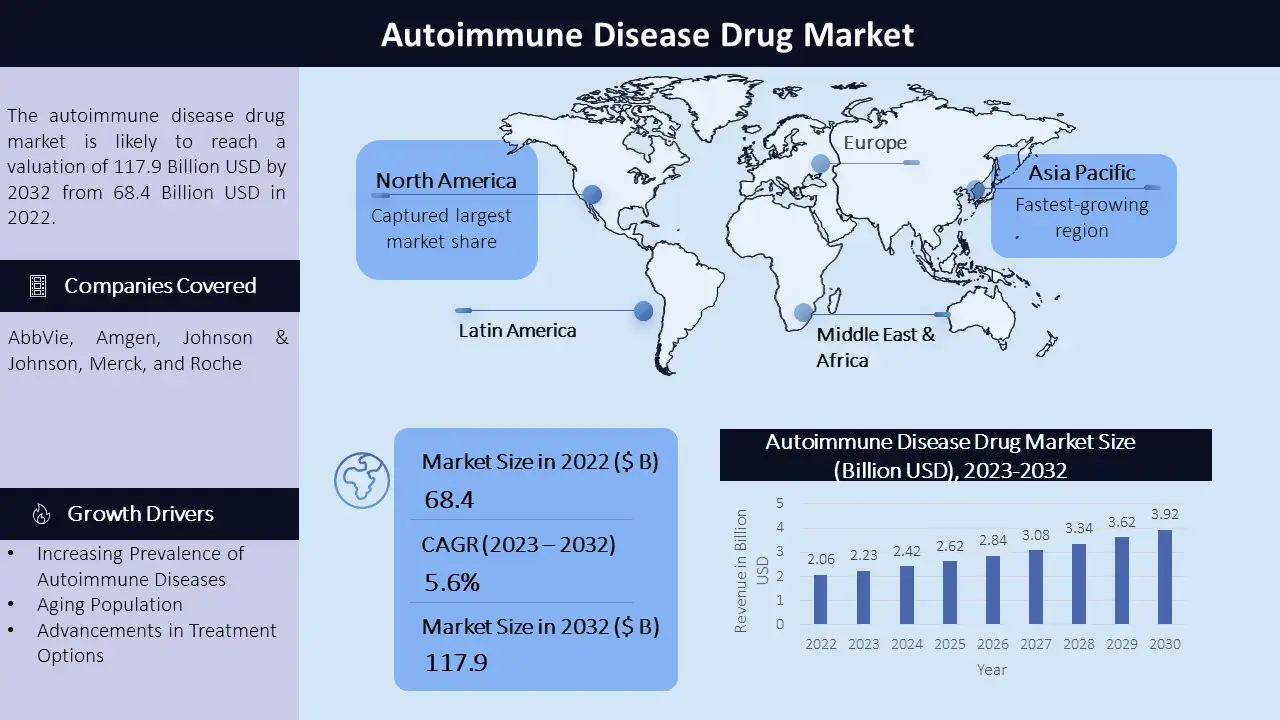Autoimmune Disease Drug Market - Global Size, Share, Trends, Growth and Forecast Year ( 2023 – 2032 )
Autoimmune Disease Drug Definition:
Autoimmune diseases are conditions in which the immune system mistakenly attacks and damages healthy cells in the body. Examples of autoimmune diseases include rheumatoid arthritis, multiple sclerosis, inflammatory bowel disease, psoriasis, and lupus. The autoimmune disease drug refers to the medicines used to cure these diseases, such as rheumatoid arthritis drugs, biologics, small molecule drugs, and many more.
Autoimmune Disease Drug Market Share and Size:
The market size for Autoimmune Disease Drug Market was USD 68.4 billion in the year 2022. It is expected that the market size for Autoimmune Disease Drugs will increase by approximately USD 117.9 billion by 2032 as the market for Autoimmune Disease Drugs is continuously growing at a compound annual growth rate (CAGR) of 5.6% during the forecast period 2023-2032. The autoimmune disease drug market is a growing market, with significant demand for effective treatments for autoimmune diseases. The market is driven by factors such as the increasing prevalence of autoimmune diseases, rising geriatric population, and advancements in treatment options.
|
Autoimmune Disease Drug Market Report Scope |
|
|
Base Year Market Size |
2022 USD 68.4 billion
|
|
Forecast Year Market Size
|
2032 USD 117.9 billion |
|
CAGR Value
|
5.6% from 2023 to 2032 |
|
Segmentation
|
|
|
Growth Drivers
|
|
Autoimmune Disease Drug Market Key Drivers:
There are various factors which help in the growth of the Autoimmune Disease Drug Market. They are as follows:
- Increasing Prevalence of Autoimmune Diseases: As the autoimmune disease is becoming prevalent, people are getting aware of the disease and its treatment. This is increasing the market demand for autoimmune disease drugs, and hence, the market is growing.
- Aging Population: The aging population is usually affected by diseases. The maximum number of people getting old age leads to an increase in people getting affected by the autoimmune disease. This leads to the growth of the autoimmune disease drug market as more people need drugs to get cured of the disease after getting affected.
- Advancements in Treatment Options: As more and more people get affected by the disease, there is a need of advance treatments for curing the disease. It leads to growth in the market demand for autoimmune disease drugs as now the drug will be used in more quantity.
Autoimmune Disease Drug Market Regional Synopsis:
- North America: The North American market dominates the market demand for autoimmune disease drugs due to its high prevalence. The market is expected to grow in the coming years.
- Europe: The European market is also expected to witness rapid growth in the autoimmune disease drug market. The region is dominating the market share due to the presence of a well-developed healthcare infrastructure.
- Asia-Pacific: The market is expected to grow significantly in the coming years due to the increasing awareness about the disease. The healthcare infrastructure is also improving in the region. Japan is a major market for autoimmune disease drugs, with significant demand for effective treatments for autoimmune diseases such as rheumatoid arthritis, multiple sclerosis, inflammatory bowel disease, and lupus. The market in Japan is driven by factors such as the increasing prevalence of autoimmune diseases, the aging population, and the availability of advanced treatments.
- Rest of the world: The rest of the world includes the Middle East and Africa. The region is having a small market as compared to the other regions but is expected to grow in the coming years.
Autoimmune Disease Drug Market Segmentation:
The Autoimmune Disease Drug Market is segmented into various categories which are listed below:
By type of autoimmune disease:
- Rheumatoid Arthritis
- Multiple Sclerosis
- Inflammatory Bowel Disease
- Psoriasis
- Lupus
By type of drug:
- Biologics
- Small molecule drugs
- Traditional drugs
By route of administration:
- Oral
- Injectable
- Topical
By geography:
- North America
- Europe
- Asia-Pacific
- Rest of the world

Autoimmune Disease Drug Market Key Players:
- AbbVie
- Amgen
- Johnson & Johnson
- Merck
- Roche
- Others

Need Customized Report for Your Business ?
Utilize the Power of Customized Research Aligned with Your Business Goals
Request for Customized Report- Quick Contact -
- ISO Certified Logo -

















